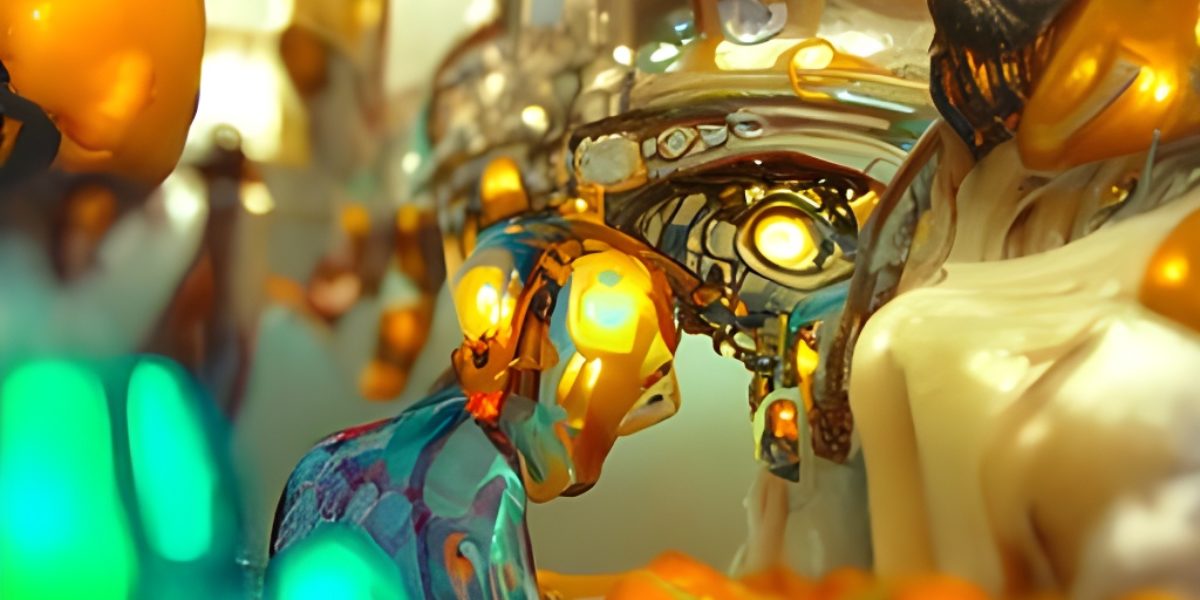Artificial Intelligence Has Freed the Man–Now Let Him Make the Bed
Tim Gouw is a writer and stay-at-home dad. He writes and speaks about (equal) parenthood and the division of roles that comes with it. Exclusively for the Third Floor, he wrote an essay within the framework of the subtheme Women as Homemakers from the exhibition Women as Technology. He wonders: if artificial intelligence (AI) is going to take over men’s jobs en masse, will the household finally become shared territory?
Artificial Intelligence Has Freed the Man– Now Let Him Make the Bed
The video lasts barely thirty seconds. When the man enters the room, it could still go either way. He walks straight towards the messy bed and opens a drawer on the left-hand side. As soon as the piece of fabric he retrieves from the drawer is flung across the room, the video starts playing in fast-forward and a timer appears at the bottom of the screen. His ‘challenge’ has just begun. The man seems to become increasingly agitated, struggling with his task, the time ticking relentlessly by. The video ends with him storming out of the room, furious. He has failed to put the duvet cover onto the duvet. The bed remains unmade; the timer freezes at twenty minutes.

The comments below the video are filled with recognition. Users and viewers tumble over one another to indicate that they recently experienced exactly the same thing. How coincidental that this video should appear on their feed today, of all days, when a similar scene unfolded in their own bedrooms. The comments have one striking similarity: they are all written by women. Apparently, it is easier to teach an algorithm to unravel women’s everyday frustrations than it is for their male partners to make a bed.
This is precisely the strange paradox we find ourselves in. The fourth industrial revolution, driven by artificial intelligence (AI), will fundamentally change the way we work and live. At least, that is the expectation.Tech CEOs Mark Zuckerberg (Meta) and Sam Altman (OpenAI) acknowledged in September of 2025 that AI investments might be a bubble. Read the article here.× Countless functions will disappear; some professions might vanish entirely. Strikingly, the roles most at risk are often male-dominated: the lorry driver battling through the rain 24/7, the stock trader who hangs on the telephone shouting, the IT specialist who performs repetitive coding tasks. AI will take over much of this work, meaning that within the foreseeable future an enormous amount of ‘man-hours’ will be freed up. The man who currently spends his days earning a wage away from home may soon find himself at home instead. Well-known tech entrepreneurs such as Eric YuanIn this New York Times newsarticle, Zoom CEO Eric Yuan predicts that AI will boost productivity so much that four- or even three-day workweeks will become possible.× of Zoom and Microsoft founder Bill GatesBill Gates spoke on The Tonight Show Starring Jimmy Fallon about the developments that AI could set in motion. Rewatch the show here.× are already speculating openly about working weeks of four or even three days.

This approaching revolution forces us to look at an inequality that has existed for decades and is deeply rooted in our culture. As early as the second feminist wave of the 1970s and 1980s, women questioned the unequal division of domestic labour. Their argument was clear: technology such as the washing machine was only truly liberating if men also took responsibility in the household. Yet the persistent image of the woman as primary homemaker remained. Decades later, the statistics show that this struggle remains unfinished: women still spend significantly more time on household tasks than men.
But what happens when the main excuse for this imbalance – a demanding job outside the home – disappears? If the man no longer sits in traffic jams daily or sits behind a computer for hours, will the household finally become a shared domain? Here lies the ultimate opportunity for equality. Technology will force us to think about our roles and the balance between work and private life. The man who loses his job to an algorithm gets the chance to become a full partner in the household. Technology thus ceases to be an extension of entrenched gender roles and becomes instead a partner in a joint endeavour.
We should not, however, be naïve about this transition. For many men, their identity is linked to their paid work. The loss of the job outside the home can lead to a feeling of uselessness and the loss of social status. It is a new role he must accept, and that requires adaptability. Society has traditionally valued men according to income and professional achievement. When that foundation is removed, he can feel lost in a domestic environment that he has never seen as his domain. A clean bathroom or a perfectly tidied kitchen do not yet offer the same social recognition as a promotion at the office.
The problem underlying this is that our society has no blueprint for ‘the successful man’ who spends his time raising children and running a household. Moreover, the skills that made him successful in the office – leading teams, closing deals, navigating office politics – are usually of little value once at home.

The man who is accustomed to reaching the top now faces the task of being the ‘best’ father or househusband, a role for which society has no clear definition of success yet. This can lead to hidden frustrations and a sense of failure, because the criteria for success are vague and unspoken. The shift is not a simple matter of ‘from office to kitchen’ but a psychological transformation with far greater impact than the loss of a payslip. The man must learn to find new ways of appreciation, outside the traditional hierarchy of the business world. It is an opportunity to create a richer bond with his family and his immediate environment, and perhaps even a revaluation of what makes us human: caring for one another and deriving happiness from the wellbeing of the other without expecting anything in return.
For many men, this will be a challenge requiring considerable psychological and mental resilience. To avoid an existential crisis, he will have to find the recognition he previously received in public in the small, daily victories: delivering the children to school on time, preparing a meal that is well received and, yes indeed, producing a perfectly made bed. Fortunately, ChatGPT also turns out to be an excellent psychologist.Listen here to the Reply All Podcast My Phone is my Psychologist.×














